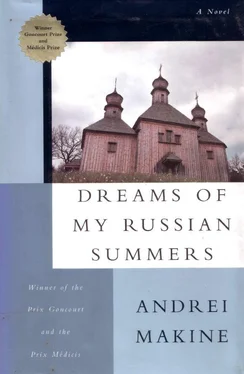When it came down to it, the revolution had achieved only one innovation in that quiet corner of Saranza. The church, which was situated at one end of the courtyard, had had its cupola removed. They had also taken out the iconostasis and installed in its place a great square of white silk – the screen made up of curtains commandeered from one of the bourgeois apartments in the "decadent" block. The Barricade cinema was ready to welcome its first audience…
Yes, our grandmother was a woman who could happily converse with Gavrilych, a woman who was opposed to all the campaigns and who had one day referred to our cinema, with a wink, as "that decapitated church." Then we had caught a glimpse of the soaring silhouette of a gilded onion and a cross, rising up above the squat edifice, whose past was unknown to us.
Far more than her clothes or her physique, it was these little touches that revealed to us that she was different. As for the French language, we basically regarded it as our family dialect. After all, every family has its little verbal whims, its tics of language, and its nicknames that never cross the threshold of the house – its private slang.
The image of our grandmother was woven from these anodyne peculiarities – eccentricities in the eyes of some people, excesses to others. That was up to the day when we discovered that a little pebble covered in rust could cause tears to glisten on her eyelashes and that French, our domestic patois, could – through the magic of its sounds – snatch from the dark and tumultuous waters a fantastical city that was slowly returning to life.
And from being a lady with obscure, non-Russian origins, Charlotte was transformed that evening into a messenger from an Atlantis, engulfed by time.
Neuilly-sur-Seine was composed of a dozen log cabins. Real izbas , with roofs covered in slender laths, silvered by the rigors of winter, with windows set in prettily carved wooden frames and hedges with washing hung out to dry on them. Young women carried full pails on yokes that spilled a few drops on the dust of the main street. Men loaded heavy sacks of corn onto a wagon. A slow herd streamed idly toward the cowshed. We heard the heavy sound of their bells and the hoarse crowing of a cock. The agreeable smell of a wood fire – the smell of supper almost ready – hung in the air.
For our grandmother had indeed said to us one day, when speaking of her birthplace, "Oh! At that time Neuilly was just a village…"
She had said it in French, but we only knew Russian villages. And a village in Russia is inevitably a ring of izbas ; indeed the very word in Russian, derevnya , comes from derevo – a tree, wood. The confusion persisted, despite the clarifications that Charlotte's stories would later bring. At the name " Neuilly " we had immediate visions of the village with its wooden houses, its herd, and its cockerel. And when, the following summer, Charlotte spoke to us for the first time about a certain Marcel Proust – "By the way, we used to see him playing tennis at Neuilly, on the boulevard Bineau" – we pictured the dandy with big languorous eyes (she had shown us his photo) there among the izbas !
Beneath the fragile patina of our French words Russian reality often showed through. The president of the Republic was bound to have something Stalinesque about him in the portrait sketched by our imagination. Neuilly was peopled with kolkhozniks. And the slow emergence of Paris from the waters evoked a very Russian emotion – that of fleeting relief after one more historic cataclysm; the joy of having finished a war, of having survived murderous repressions. We wandered along its streets, which were still wet, covered with sand and mud. The inhabitants were piling furniture and clothes outside their doors to let them dry – as Russians do, after a winter they had been beginning to think would never end.
And then, when Paris was resplendent once more in the fresh spring air, whose scent we guessed intuitively, there was a fairy-tale train, drawn by a garlanded engine slowing down and coming to a halt at the gates of the city, before the pavilion at Ranelagh station.
A young man wearing a simple military tunic stepped down from the railway carriage, walking on the purple cloth spread at his feet. He was accompanied by a woman, also very young, in a white dress with a feather boa. An older man, in formal attire, with a magnificent mustache and a fine blue ribbon on his breast, emerged from an impressive gathering grouped under the portico of the pavilion and advanced toward the couple. The gentle breeze caressed the orchids and the amaranths that decorated the pillars and stirred the feather on the young woman's white velvet hat. The two men shook hands.
The master of Atlantis resurgent, President Félix Faure, was welcoming the tsar of all the Russias, Nicholas II, and his wife.
It was the imperial couple, escorted by the elite of the Republic, who were our guides through Paris… Several years later we learned the true chronology of this glorious visit. Nicholas and Alexandra had not come in the spring of 1910, after the flood, but in October 1896, that is to say well before the rebirth of our French Atlantis. But this real sequence hardly mattered. For us only the chronology of our grandmother's long stories counted: one day, in their legendary time, Paris arose from the waters; the sun shone, and at once we heard the still distant cry of the imperial train. This sequence of events seemed just as legitimate to us as the appearance of Proust among the peasants of Neuilly.
Charlotte's narrow balcony hovered in the aromatic breeze of the plain, at the outer limit of a sleeping town, cut off from the world by the eternal silence of the steppes. Each evening resembled an alchemist's legendary vessel, in which an astonishing transmutation of the past took place. To us the elements of this magic were no less mysterious than the components of the philosophers' stone. Charlotte unfolded an old newspaper, brought it close to her lamp with its turquoise shade, and proclaimed for us the menu for the banquet given in honor of the Russian sovereigns when they arrived at Cherbourg:
Soup
Bisque of shrimps
Cassolettes Pompadour
Loire trout braised in Sauternes
Fillet of salt lamb with cèpes
Vine quails à la Lucullus
Poulardes du Mans Cambacérès
Sorbets in Muscat de Lunel
Punch à la romaine
Roast bartavels and ortolans, garnished with truffles
Pâté de joie gras of Nancy
Salad
Asparagus spears with sauce mousseline
Ice cream "Success"
Dessert
How could we decipher these cabbalistic formulae? "Bartavels and ortolans!" "Vine quails à la Lucullus "! Our grandmother, under-standingly, tried to find equivalents, citing the very rudimentary produce that was still to be found in Saranza's shops. Enthralled, we savored these imaginary dishes, enhanced by the misty chill of the ocean (Cherbourg!), but already it was time to set off again in pursuit of the tsar.
Like him, entering the Elysée Palace, we were startled by the spectacle of all the black suits that fell motionless at his approach – just think, more than two hundred senators and three hundred deputies! (Who, according to our own chronology, had only a few days previously been traveling to their session by boat…) Our grandmother's voice, which was always calm and a little dreamy, became tinged at that moment with a slight dramatic tremor: "You see, two worlds found themselves face to face. (Look at this photo. It's a pity the newspaper has been folded for so long…) Yes, the tsar, an absolute monarch, and the representatives of the French people! The representatives of democracy…"
Читать дальше












